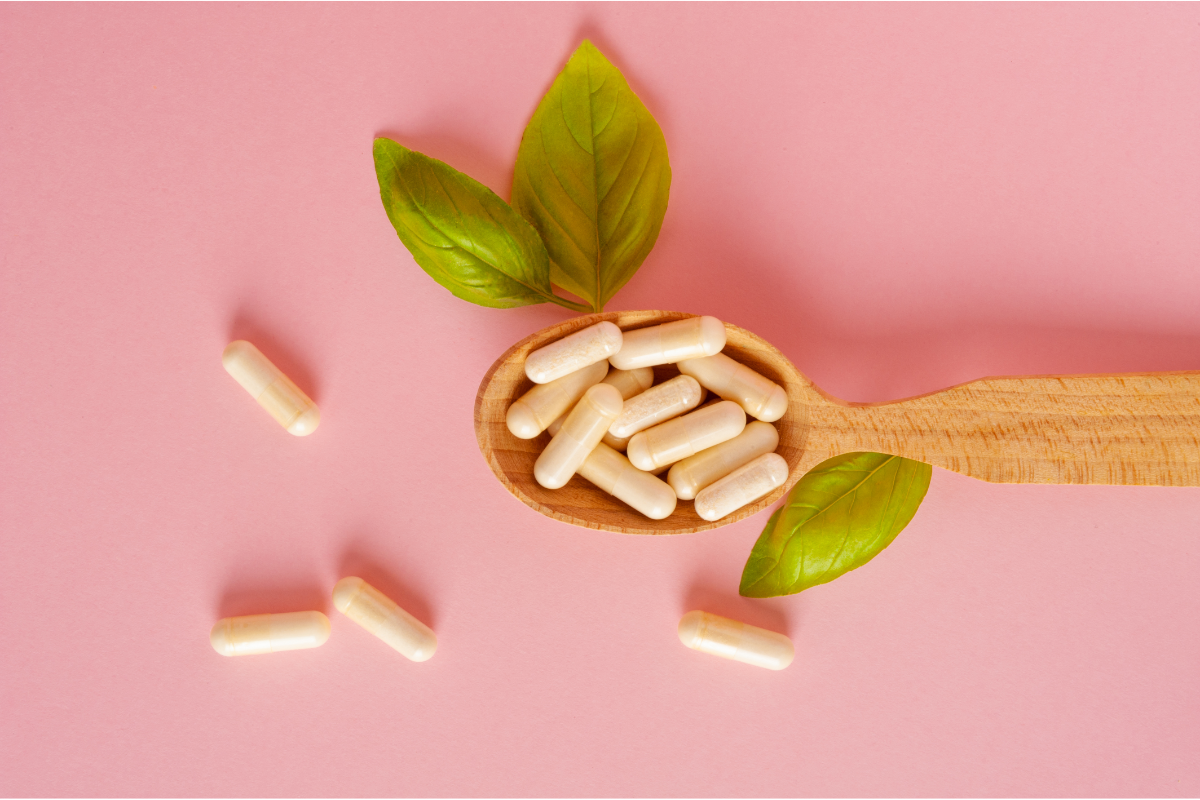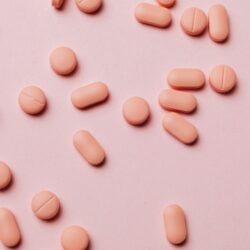Organic farming was born of the initiative of agronomists, doctors, farmers and consumers who, in the 1920s, generated new currents of thought based on ethical and ecological principles, and initiated an alternative method of agricultural production that favoured working the soil, self-sufficiency and respect for natural balances. As the 1970s approached, major sociological changes had a major influence on the development of organic farming. In 1981, the French public authorities officially recognised organic farming. A National Commission was set up, responsible for organising and developing organic farming in France and approving specifications.
What is an organic food supplement?
As the name suggests, organic food supplements are substances taken to supplement conventional food.
They are taken to make up for deficiencies in the body or to meet specific needs. They are there to enable small adjustments to be made to the body, to maintain health and to make up for deficiencies.
In theory, the usual diet should be sufficient to provide the body with all the nutrients, both macro- and micro-elements, that it needs. However, your daily diet rarely adapts. The resulting deficiency can lead to metabolic disorders and even disease.
And the role of food supplements is precisely to make up for the deficiencies in this poor diet in order to prevent these illnesses. Some help to revitalise. So there’s no denying that, used wisely and adapted to our real needs, food supplements can be genuinely beneficial to our health and well-being.
Why choose an organic food supplement?
Organic certification is a guarantee of quality certified by an approved body. For example, Arkopharma Laboratories are regularly audited by a certification body (ECOCERT) to verify their commitment to Organic Farming.
An organic food supplement is certified by an approved body responsible for checking the quality of the product sold by the laboratory. This is a Community regulation EC N°834/2007 on organic production and labelling of organic products, applicable since 1 January 2009, on the basis of which the certification bodies audit the operators. This is the guarantee of naturalness and authenticity. Organic farming uses cultivation and breeding practices that respect natural balances and animal welfare. It excludes the use of synthetic chemicals and GMOs and limits the use of inputs.
There are many benefits for society, not only in terms of preserving the quality of the soil, air, water and biodiversity, but also in terms of obtaining products with proven health and nutritional qualities, an identification of quality and origin, and so on
Whatever the product category, the processing of organic products is subject to the following rules:
- No use of genetically modified organisms
- No synthetic chemical pesticides (insecticides, synthetic fungicides, etc.)
- It is forbidden to use the same organic and non-organic ingredients in the same foodstuff
- Organic and non-organic preparations must be separated in space or time
- An organic product is made up of a majority (>50%) of agricultural ingredients, 95% of which must be organically produced. Water and salt are not taken into account when calculating the percentage. The remaining 5% are agricultural ingredients listed in Annex IX of Regulation (EC) No 889/2008. Non-agricultural ingredients are < 50% and must be included in the list of authorised additives in Annex VIII of Regulation (EC) No 889/200. Note that some additives are marked with an asterisk because they are of agricultural origin and must be included in the proportion of ingredients of agricultural origin.
How to choose your food supplement?
The first step in choosing the right dietary supplement is to determine the body’s real needs. Nutritional requirements differ from one individual to another. They depend on many factors, such as age, sex, state of health and lifestyle.
A sportsperson will not have the same needs as a sedentary person, just as a pregnant woman will not have the same needs as a woman who is breastfeeding or going through the menopause. As the choice of a dietary supplement has a direct impact on our health, it is absolutely essential to check for interactions with current medicines and treatments, and to verify the compatibility of the dietary supplement with our current state of health. Specialists often recommend carrying out a health check, in order to personalise food supplements to have a more targeted effect on deficiencies and to avoid taking unnecessary risks.
To choose the right organic food supplements from your pharmacy, there are a number of essential criteria to take into account:
-
Choice of supplier:
Give preference to products manufactured in Europe. It should be pointed out that European regulations are among the strictest in the field. This also ensures better product traceability.
In this respect, the Made in France label is often a guarantee of quality. For over-the-counter products, it is much better to buy them from a pharmacy.
-
Packaging and labelling:
Pay attention to the condition of the packaging and the label, as well as to everything it says. Poorly written or imprecise labelling is often a sign of inferior quality. Take the time to check the information on the label. It should include :
- the name and content of the product’s nutrient categories and substances
- the recommended daily dosage
- a warning about sticking to the stated dose
- a statement aimed at combining the supplement with a balanced diet and avoiding the use of the food supplement as a substitute for a diet
- a warning about precautions for use, including keeping out of reach of children, use by pregnant or breast-feeding women, etc
-
Composition:
Find out about the ingredients in the food supplement. It is strongly recommended that you choose products with the best natural ingredients, including vitamins C, D and E, trace elements and minerals, particularly magnesium, taking care to avoid magnesium chloride.
Make sure the food supplement is made from organically-grown plants, without additives. Synthetic products are generally not tolerated by the body and are dangerous to health. Vitamins and beta-carotenes must be natural.
The most important point is to check for the presence of the plant’s active ingredient. Polyphenols, particularly those found in plants, fruit and vegetables, are to be preferred.
Traceability and transparency
Traceability of ingredients is a crucial element in the choice of your supplements. It ensures that each component of the product can be traced back to its source. This involves a rigorous verification process where every stage, from cultivation to harvesting, processing and packaging, is conscientiously checked. Traceability guarantees the quality and purity of ingredients, while ensuring that manufacturing practices are ethical and sustainable.
Transparency on the part of manufacturers is just as important. Companies that openly share information about their sources of supply and production methods are generally more trustworthy. This transparency is a guarantee of quality and demonstrates the manufacturer’s commitment to responsible practices.
Importance of provenance
The origin of the ingredients plays a major role in determining the quality of the food supplement. Ingredients from regions recognised for their organic and sustainable farming practices are often preferable. For example, certain ingredients such as acai berries or spirulina, when grown in their natural habitats, can offer a higher concentration of nutrients.
What’s more, local ingredients have the advantage of having a lower environmental impact, due to shorter transport distances. Opting for supplements made from local ingredients not only helps to support the local economy, but also reduces the overall carbon footprint.
-
Food supplement presentation:
The therapeutic value of a plant depends on the preservation of the active principle behind its virtue. Each form has its advantages and disadvantages.
For water-soluble molecules, herbal teas and decoctions are the most appropriate. However, a very large quantity is needed to fully benefit from all the active ingredients.
- Mother tinctures : also interesting, although their use is contraindicated in certain groups of individuals due to the high alcohol content.
- Capsules: prepared from roots are practical and of high quality, but they do not keep well.
- Tablets : simple and practical, but take time to take effect.
- Capsules : also practical, but their shelf life is limited and you have to wait a long time before feeling the benefits.
- Essential oils: ideal, but need to be used with great care.
- Delayed-release microbeads: by far the best dietary supplements, but they are very expensive and very few people can afford them.
- Fluid extracts: excellent in terms of concentration of active ingredients, but they are not available and their use remains confidential.
-
The quality label :
The quality label is an essential criterion when it comes to food supplements. ISO 22000-certified laboratories comply with the legal framework for food supplements, and can therefore be considered a guarantee of quality. The same applies to the “manufactured under pharmaceutical good practice” standard.
Products containing synthetic excipients and additives should be avoided. Prefer products bearing the certified organic label (Ecocert, AB, etc.). Products that are much more easily assimilated.
In some cases, however, products based on plants grown in the wild may be more effective than an organic product.
When it comes to choosing an organic food supplement, it’s crucial to understand the importance of certifications and labels. These certifications not only guarantee the organic quality of the products, but also ensure that production is respectful of the environment and human health.
Organic labels and recognised certifications
Organic labels, such as “AB” (Agriculture Biologique) in France or “USDA Organic” in the United States, are reliable indicators of a product’s organic quality. These certifications require that products are grown without the use of synthetic pesticides, chemical fertilisers or GMOs (Genetically Modified Organisms). The presence of these labels on a food supplement indicates that it has undergone strict controls throughout its production chain.
By choosing products with these certifications, you are not only ensuring a healthier and safer product, but you are also contributing to sustainable agriculture. It is essential to check these labels to ensure that organic standards are respected.
-
Dosage:
Prefer food supplements with a dosage that can be taken throughout the day. According to naturopaths, therapists and specialists, a food supplement taken once a day should not be recommended.
-
Price :
It’s often a mistake to link quality to price, but when it comes to food supplements, this association proves accurate in most cases. A cheap dietary supplement is rarely a good dietary supplement. Obviously, this does not mean that an expensive dietary supplement is always a good dietary supplement.
-
Side effects:
Like any medicine, any plant, however effective, is bound to have side effects. These side effects must be clearly indicated on the packaging or, failing that, in the leaflet that comes with the dietary supplement.
For more information, don’t hesitate to ask your doctor or pharmacist for advice..






Thanks for sharing an article.
I`m glad to read this.